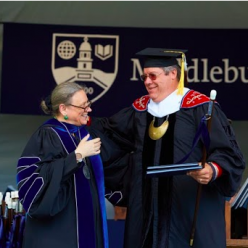by Faith Wood ‘24.5 and Tate Sutter ‘24.5
On January 28th, 2021, Laurie Patton, the president of Middlebury College, announced the implementation of a land acknowledgement. In the announcement, five initiatives were outlined to “create deeper engagement with the original Indigenous inhabitants” of Middlebury (“Middlebury Land Acknowledgement”). These initiatives are,
[C]eremonial and other use of College lands by local Indigenous peoples; cultivating, honoring, and teaching about traditional Abenaki food, medicine, and seed crops at The Knoll, the College’s teaching garden; a Clifford Symposium on indigeneity; supporting a greater presence of Indigenous students, staff, and faculty; [and] creating new Indigenous-focused courses or course elements (“Middlebury Land Acknowledgement”).
Our article analyzes the extent to which the College is working to accomplish these goals, and which areas it has yet to follow through on. This project is not meant to give an exhaustive list or delve deeply into any one initiative, but serve simply as an outline of what the College is doing. While these initiatives are a necessary first step towards advancing relations between the College and the Abenaki, they should only be a foundation from which the College builds.

When it comes to the use of College lands, there is a proposed land access agreement between the College and the Nulhegan Band of the Coosuk Abenaki Nation. This agreement would enable Abenaki people to harvest plants on much of the College’s 6,000 acres in the Lake Champlain Valley and the Green Mountains (Lapin). In doing so, Middlebury would open lands for Abenaki people to practice their ceremonies and traditions.
Since 2019, the school has been partnering with Nulhegan Chief Don Stevens on projects related to The Knoll. In the past, The Knoll has grown Skunk Beans and Koasek Corn (Brakeley and Stevens). They also have plans to incorporate more crops native to this land into the garden (“The Knoll at Middlebury College”). For more information on The Knoll, see “Abenaki Involvement with The Knoll”.

We were unable to find relevant sources on the Clifford Symposium on indigeneity. The lack of online presence does not definitively mean that discourse for this event is not in the works, but that, if it does exist, it is not available for the public to view and track. Therefore, we propose that the people organizing these initiatives make their plans accessible in order for the student body to be assured that progress towards this goal is actually being made.
Indigenous presence on campus is very low. As of Fall 2020, the college has only two students who identify as American Indian or Alaska Native (“Fall 2020 Student Profile”). Indigenous students can be supported by creating Indigenous spaces on campus, scholarships, and free tuition (Red Shirt-Shaw) (Melvin 50). Similar actions have been taken at other schools to create a more welcoming environment for Indigenous students. Many Indigenous students feel more comfortable around Indigenous staff and faculty. An informal idea of a position, held preferably by someone from the Abenaki community, to coordinate College-Abenaki relations could not be funded with the College’s current finances. Considering the challenges Indigenous people face in going to and graduating from college all over the country, it seems that institutional change on a larger scale is also necessary to help Indigenous students thrive at Middlebury.
There are some new courses with Indigenous foci. Two examples include this class, FYSE 1570A: Native Presence and Performance, and THEA 0246A: Contemporary Native American Playwrights, both taught by Professor Olga Sanchez Saltveit. The College has offered other courses around Indigenous peoples; however, far more could be done to increase education on the Abenaki and Indigenous ways of life in general.
President Patton’s announcement was one of the first statements pertaining to the relationship between Middlebury College and the Abenaki that contained explicit points of action. It is vital that the College enacts these initiatives. The history of colonial institutions of education towards Indigenous peoples has been marred with theft, patronization, and erasure. If we do not want Middlebury College to continue this history, we must hold the College accountable to its own words. As students, we must also hold ourselves accountable for actively participating in and bolstering these projects in the College and beyond. At the same time, our current efforts are just beginning the long processes of decolonizing our higher education system and restoring relationships with the people whose lands the colleges in this country sit upon.
Further Reading
Hierarchies of Knowledge and Decolonizing the Higher Education System
Works Cited
Brakeley, Megan and Stevens, Don. “Abenaki at the Knoll.” YouTube, uploaded by Midd Sustainability, 3 September 2020, https://youtu.be/8dlQxi-KE5o.
Lapin, Marc. “Re: College Lands.” Received by Tate Sutter, 29 April 2021.
Melvin, Jenkins. “Factors Which Influence the Success or Failure of American Indian/Native
American College Students.” Research and Teaching in Developmental Education, vol. 15, no. 2, Apr. 1999, pp. 49–54. EBSCOhost, search.ebscohost.com/login.aspx?direct=tr ue&db=edsjsr&AN=edsjsr.42802513&site=eds-live&scope=site.
“Middlebury Land Acknowledgement.” Middlebury College, http://www.middlebury.edu/about/land-acknowledgement, Accessed on 05 May 2021.
Red Shirt-Shaw, Megan. “Beyond the Land Acknowledgement: College “LAND BACK” or Free Tuition for Native Students.” Hack the Gates: Radically Reimage Admissions, August 2020, https://hackthegates.org/wp-content/uploads/2020/08/Redshirt-Shaw_Landback_HTGreport.pdf, Accessed on 22 April 2020.
“The Knoll at Middlebury College.” MiddFarms. 15 Apr. 2021. Web. 22 Apr. 2021.
